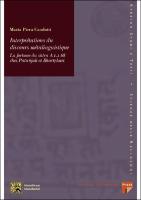Interprétations du discours métalinguistique
La fortune du sutra A 1 1 68 chez Patañjali et Bhartrhari
| dc.contributor.author | Candotti, Maria Piera | |
| dc.date.accessioned | 2022-05-31T10:13:04Z | |
| dc.date.available | 2022-05-31T10:13:04Z | |
| dc.date.issued | 2006 | |
| dc.identifier | ONIX_20220531_8884534518_71 | |
| dc.identifier.issn | 2704-5919 | |
| dc.identifier.uri | https://library.oapen.org/handle/20.500.12657/54788 | |
| dc.language | Italian | |
| dc.relation.ispartofseries | Studi e saggi | |
| dc.subject.other | Lingua sanscrita | |
| dc.subject.other | Linguistica | |
| dc.subject.other | Cultura indiana | |
| dc.subject.other | India | |
| dc.title | Interprétations du discours métalinguistique | |
| dc.title.alternative | La fortune du sutra A 1 1 68 chez Patañjali et Bhartrhari | |
| dc.type | book | |
| oapen.abstract.otherlanguage | Ancient linguistic reflection in India was able to combine the analysis of Sanskrit with the awareness that the language through which this analysis is conducted (Sanskrit) is different from the object it examines. Although this language-tool finds its dimension in the artificial Sanskrit of the sütras - the aphorisms of Påñini's grammar - metalinguistic discourse is not restricted to specialized discourse: common speech abounds in metalinguistic notations. The present work focuses on the testimonies of the grammatical school of Pâininian origin, by trying to retrace the course by which metalanguage left the field of naive linguistics to become an object of the school. | |
| oapen.identifier.doi | 10.36253/88-8453-451-8 | |
| oapen.relation.isPublishedBy | bf65d21a-78e5-4ba2-983a-dbfa90962870 | |
| oapen.relation.isbn | 8884534518 | |
| oapen.relation.isbn | 9788855188159 | |
| oapen.series.number | 38 | |
| oapen.pages | 418 | |
| oapen.place.publication | Firenze |

